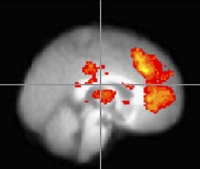Brain reacts to fairness as it does to money and chocolate
The human brain responds to being treated fairly the same way it responds
to winning money and eating chocolate, UCLA scientists report. Being treated
fairly turns on the brain's reward circuitry.
"We may be hard-wired to treat fairness as a reward," said study co-author
Matthew D. Lieberman, UCLA associate professor of psychology and a founder
of social cognitive neuroscience.
 |
"Receiving a fair offer activates the same brain circuitry as when
we eat craved food, win money or see a beautiful face," said Golnaz
Tabibnia, a postdoctoral scholar at the Semel Institute for Neuroscience
and Human Behavior at UCLA and lead author of the study, which appears
in the April issue of the journal Psychological Science. The activated brain regions include the ventral striatum and ventromedial prefrontal cortex. Humans share the ventral striatum with rats, mice and monkeys, Tabibnia said. |
"Fairness is activating the same part of the brain that responds to food in
rats," she said. This is consistent with the notion that being treated
fairly satisfies a basic need, she added.
In the study, subjects were asked whether they would accept or decline
another person's offer to divide money in a particular way. If they
declined, neither they nor the person making the offer would receive
anything. Some of the offers were fair, such as receiving $5 out of $10 or
$12, while others were unfair, such as receiving $5 out of $23.
"In both cases, they were being offered the same amount of money, but in one
case it's fair and in the other case it's not," Tabibnia said.
Almost half the time, people agreed to accept offers of just 20 to 30
percent of the total money, but when they accepted these unfair offers, most
of the brain's reward circuitry was not activated; those brain regions were
activated only for the fair offers. Less than 2 percent accepted offers of
10 percent of the total money.
The study group consisted of 12 UCLA students, nine of them female, with an
average age of 21. They had their brains scanned at UCLA's AhmansonóLovelace
Brain Mapping Center. The subjects saw photographs of various people who
were said to be making the offers.
"The brain's reward regions were more active when people were given a $5
offer out of $10 than when they received a $5 offer out of $23," Lieberman
said. "We call this finding the 'sunny side of fairness' because it shows
the rewarding experience of being treated fairly."
A region of the brain called the insula, associated with disgust, is more
active when people are given insulting offers, Lieberman said.
When people accepted the insulting offers, they tended to turn on a region
of the prefrontal cortex that is associated with emotion regulation, while
the insula was less active.
"We're showing what happens in the brain when people swallow their pride,"
Tabibnia said. "The region of the brain most associated with self-control
gets activated and the disgust-related region shows less of a response."
"If we can regulate our sense of insult, we can say yes to the insulting
offer and accept the cash," Lieberman said. UCLA is California's largest
university, with an enrollment of nearly 37,000 undergraduate and graduate
students. The UCLA College of Letters and Science and the university's 11
professional schools feature renowned faculty and offer more than 300 degree
programs and majors. UCLA is a national and international leader in the
breadth and quality of its academic, research, health care, cultural,
continuing education and athletic programs. Four alumni and five faculty
have been awarded the Nobel Prize.
2007. Copyright Environmental News Network To subscribe or visit go to: http://www.enn.com